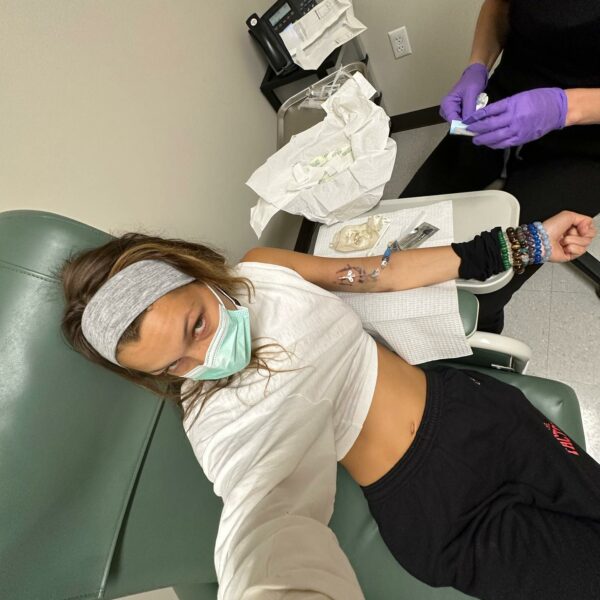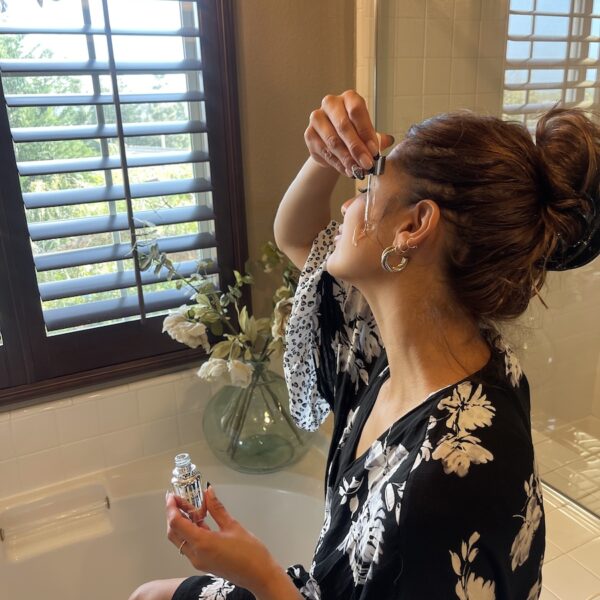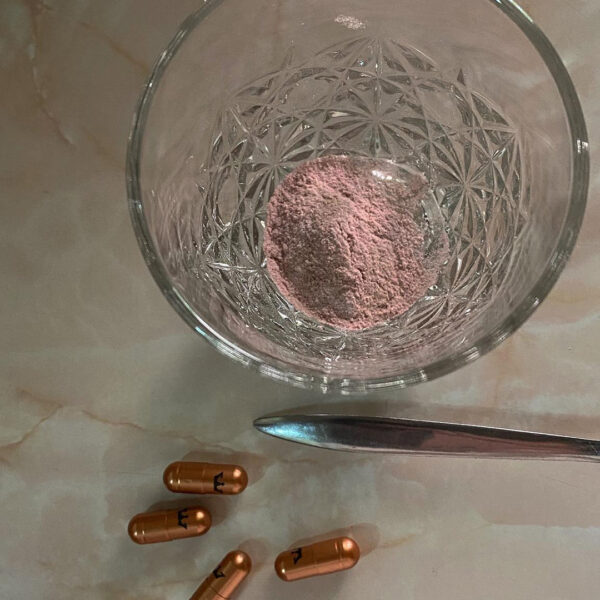Short on time? Poosh here for the summary.
Got acne? The call may be coming from inside the house.
“The management of gut health is a pivotal aspect of treating and preventing acne,” says Chloe Williams, RHN, founder of Eunoia Wellness. “The health of our gut plays a crucial role in influencing the type and severity of acne we experience. This is because imbalances in the gut microbiome can affect our body’s inflammatory response, hormone regulation, and detoxification processes, all of which are key factors in the development of acne.”
Below, we explore the link between gut health and acne and how getting to the root of gut health issues is the ultimate skincare hack.
Your gut and skin are always giving each other the hot goss.
“Imagine your gut and skin are best friends, talking to each other through a special connection called the gut-skin axis. This connection means that whatever is happening in your gut doesn’t just stay there. It can show up on your skin as well,” Chloe says.
“Since we know that disruptions in the gut microbiome can directly impact skin health, it makes the management of gut health a critical factor in treating and preventing acne,” she says.
A happy gut = happy skin.
“A happy, healthy gut has a balanced mix of good bacteria, kind of like a thriving ecosystem in a forest. This balance is incredibly important for our overall health, which also includes how our skin looks and feels. When this ecosystem is in harmony, it’s like a green light for clear, healthy skin,” she says.
But, as we all know, sh*t happens.
Well, well, well. How the turntables. (If you don’t get that reference, congrats on being young.) Things like stress, antibiotics, and eating too much sugar and processed foods can throw off this delicate balance. “Think of it as tipping the scales, where the bad bacteria start to outnumber the good ones,” Chloe explains. “This can lead to inflammation, which is our body’s way of saying, ‘Hey, something’s not right here!’ This inflammation isn’t just an internal issue because it can travel through our bloodstream and show up on our skin as acne.”
A cranky gut doesn’t take care of the lining that keeps all those toxins out.
“Our gut has this protective lining that keeps the bad stuff (like toxins) inside, so they can be safely removed from our body. But when the gut is unhappy, this lining can get compromised,” Chloe says.
“It’s like having a bunch of holes in a fence that’s supposed to keep the unwanted critters out. When this happens, toxins that should be leaving our body the usual way (through our gut) might find another exit through our skin, causing acne or making existing skin conditions worse.”
So what happens when the barrier is breached?
“Here’s how poor gut health can manifest in various types of acne,” Chloe says.
- Pimples: “These are often the most common form of acne, appearing as small, inflamed bumps on the skin caused by bacteria infecting clogged pores. An unhealthy gut can exacerbate these breakouts by promoting inflammation and disrupting the balance of good and bad bacteria in the body,” she explains.
- Cystic Acne: “Representing a more severe type of acne, cystic lesions form deep under the skin and are often painful. They are closely linked to hormonal imbalances and heightened levels of inflammation, conditions that can be aggravated by compromised gut health,” Chloe explains.
- Blackheads and Whiteheads: “Known scientifically as open and closed comedones, blackheads and whiteheads are formed by the accumulation of oil and dead skin cells in pores,” Chloe says. “A poorly functioning gut can contribute to these issues by affecting the skin’s natural oil production and shedding of dead skin cells, leading to clogged pores.”
Gut health can also influence where your breakouts show up.
“If you’ve ever noticed that acne seems to target certain areas more than others, it’s because your gut health might be influencing where those breakouts decide to show up,” she says. “This connection comes from a traditional practice known as face mapping that’s used in Traditional Chinese Medicine, which suggests that different parts of your face are linked to various internal health conditions, including the state of your gut.”
Acne linked to gut issues tend to show up in these places:
- Lower cheeks
- Jawline
- Chin
- Forehead
Signs that the call is coming from inside the house.
“When considering the possibility that acne might stem from gut-related issues, there are several key indicators to watch for,” Chloe says.
- “Experiencing persistent digestive symptoms such as bloating, gas, constipation, diarrhea, or signs of irritable bowel syndrome (IBS) alongside acne suggests a direct link to gut health,” she says. “These digestive disturbances can be a clear sign that an imbalance in gut flora or overall digestive distress might be contributing to skin problems.”
- “If you notice that your skin reacts negatively after consuming certain foods, this is another significant indicator,” she says. “This reaction can be an indicator of food sensitivities or intolerances, particularly to items like dairy, gluten, sugar, and high-glycemic foods. These foods can trigger inflammatory responses within the gut that may manifest externally as acne.”
- “The presence of chronic inflammation in the body, evidenced by symptoms like joint pain or fatigue, is another major indicator that gut health issues are playing a role in acne development,” Chloe says. “This systemic inflammation which is often rooted in gut dysbiosis (a fancy way of saying an imbalance gut) or leaky gut syndrome, can have wide-ranging effects, including on the skin.”
Moral of the story: listen to what your body is telling you.
“I really want to emphasize the importance of shifting our perspective towards our skin and overall health,” Chloe concludes. “Often, we find ourselves in a cycle of frustration and negativity, asking, ‘What’s wrong with me?’ or resenting our skin for its imperfections.
“But it’s crucial to remember that our bodies communicate with us through symptoms because they don’t have a voice in the traditional sense. Instead of quickly trying to silence these signals, we should strive to understand what our body is attempting to tell us. By listening to and learning from our body’s signals, we can embark on a more informed, compassionate journey towards wellness.”
Shop our daily supplements collection:
The content provided in this article is provided for information purposes only and is not a substitute for professional advice and consultation, including professional medical advice and consultation; it is provided with the understanding that Poosh, LLC (“Poosh”) is not engaged in the provision or rendering of medical advice or services. The opinions and content included in the article are the views of the author only, and Poosh does not endorse or recommend any such content or information, or any product or service mentioned in the article. You understand and agree that Poosh shall not be liable for any claim, loss, or damage arising out of the use of, or reliance upon any content or information in the article.
That’s because imbalances in the gut microbiome can affect our body’s inflammatory response, hormone regulation, and detoxification processes, all of which are key factors in the development of acne.
A happy, healthy gut has a balanced mix of good bacteria. Things like stress, antibiotics, and eating too much sugar and processed foods can throw off this delicate balance and cause inflammation that can travel through our bloodstream and show up on our skin as acne.
The gut has a protective lining that keeps the bad stuff (like toxins) inside, so they can be safely removed from our body. When the gut is unhappy, its protective lining can get compromised and these toxins can escape and find another exit through our skin. This—you guessed it—can cause acne.
Up next, be the first to know our weekly content and sign up for our Poosh newsletter.
TL;DR
The health of our gut plays a crucial role in influencing the type and severity of acne we experience.




































